- Home
- Andrew McGahan
1988 Page 9
1988 Read online
Page 9
‘No one gave me any.’
Vince nodded. He took out a pouch of tobacco and began rolling a new cigarette. He looked at our pile of luggage.
I said, ‘We didn’t really know what to bring.’
‘You got insect repellent?’
‘Yes.’
‘You’ll survive then.’
We loaded up the Toyota. When it was finished we waited and watched while the pilot got his plane going again. He taxied off to the far end of the strip, then turned and roared back down. He lifted, rose, cleared the trees, then curved away to the west. We watched the plane until it disappeared. Vince stubbed out his latest cigarette. It was his fourth or fifth since we’d met. ‘Let’s go,’ he said.
I rode in the front, Wayne rode in the back. Vince drove without speaking. He had a tight, closed face, sunburnt and unshaven. The cabin smelt of tobacco and petrol. I watched out the window. The track wound its way through the bush, rising and falling slightly. A few times I caught the faint tang of salt air. The ocean was near, but the trees and scrub were too dense to see far on either side.
Vince broke the silence. ‘Exciting flight?’ he asked.
‘No. Not really.’
‘Least you finally got here.’
‘Are we late?’
‘I was told you’d be here a month ago. That’s when the last weather observer left.’
‘Who’s been doing the weather observations?’
‘Me.’
‘Are you the only person here?’
‘Until now.’ He glanced over. ‘What’re you? Another artist?’
‘I’m supposed to be writing.’
He nodded, lips clamped around a butt. ‘A writer.’
After a few more minutes we drove up a long, gentle slope. At the top the bush fell away and we were in the clearing. It was a rough circle, partly gravel, partly clumps of long brown grass. On the far side was the lighthouse. It looked no better from the ground than it had from the air. It was graceless, a tube of unpainted concrete. At other points around the circle were three houses, some sheds, and a few palm trees.
‘I’d give you a tour,’ said Vince, ‘But this is it. There’s the airstrip, there’s here, and there’s the road in between. There’s a little bay too, back a bit, where we keep the boats. But that’s all.’
We bumped across to the furthest house and pulled up in front. We climbed out.
‘This is where you’ll be living.’ He pointed at the other two houses. ‘That one over there’s mine. And the other one belongs to Russel and Eve. That’s the Aboriginal ranger and his wife, but they won’t be around for a while.’
I looked at our house. It was old, with thick stone walls. A low verandah ran around it. Parts of the verandah were in ruins, the floor gone, the gutters hanging askew from the roof. The other two houses were in much better condition. Freshly painted, fully intact.
‘It’s a bit of a mess compared to the others,’ Vince said, watching us, ‘But come on through.’
We explored. It must have been, at one stage, a beautiful place. It had large, airy rooms and high ceilings. French windows opened from every room, out to the verandah. Vince gave us some of its history. It had been built, along with the lighthouse, in 1916. The light had needed three keepers in those days, hence three houses for the men and their families. Later it was semiautomated and only needed one. Then, in 1983, it was fully automated and the last keeper was retired. Apparently by then the houses were in serious decline. When the Conservation Commission took control of the area it was decided to refurbish two of them. The third, however—ours—was considered too far gone to bother.
I could see why. The house was built on a slope, dropping away from front to back, so that the back verandah should’ve been seven or eight feet off the ground. There hardly was a back verandah. The stairs had disappeared completely, and most of the floorboards had collapsed as well. Small bushes and vines were growing up through the naked support beams. All that was left was a space about ten feet square, immediately outside the kitchen door.
Inside, the place was filthy. The kitchen was black with grease and soot. It smelled as if someone had been cooking in there with kerosene. The laundry and the bathroom were thick with spider webs and dust. The bottom of the bathtub was layered with rotting oranges. The huge dining room wasn’t too bad, but it was devoid of any furniture except one small table and the rusting hulks of three refrigerators.
As for the bedrooms, there were four of them, opening off a long central hallway. Two of them were completely empty. Another was crowded with a jumble of blackened bed frames and old mattresses. The last was being used as a storeroom. It was stacked with cans of paint, insecticides and various other noxious items. There was also some fishing gear, a couple of scuba tanks, a compressor, even a spear gun.
Everywhere the paint was faded and peeling. Much of the woodwork was rotten, both in the floors and the ceiling, and most of the glass was smashed. The lighting consisted of naked and loosely attached fluorescent tubes. The only luxury items visible were ceiling fans, one in each room, two in the dining room. All of them were switched on, revolving on low speed, squeaking and scraping.
‘Don’t ever turn the fans off,’ Vince said, ‘They’ve been on for years. In this air they’d rust solid in a few weeks if they stopped. And you need them. The wind helps keep the sandflies off at night. Without them you’d get eaten alive.’
We emerged onto the front verandah again, stood there for a moment. I wasn’t sure what to say. This was our house?
Vince cleared his throat. ‘I suppose I should’ve cleaned it up a little before you came. No one’s used it in years. I switched one of the fridges on for you though.’
‘Thanks. A lot.’
He shrugged one shoulder. ‘Let’s get your stuff in.’
It was around four-thirty by the time we were unloaded. Vince mentioned that, as we should know, there was a weather observation due at six p.m. His plan was to do the next few observations himself, until we were settled in. He also thought it might be a good idea if we watched him do a couple first. So if we wanted we could meet him at the weather shack at five forty-five. He pointed out the shack, a small building near the foot of the lighthouse. With that, he got in the Toyota and drove back to his own place.
We watched him go. Then we wandered through our house again. Despite all the grime, there was still a gaunt beauty about it. Space was the thing. The rooms were built to a colonial scale. We found ourselves on the back verandah, looking out. There was a view of the ocean, pale blue, maybe a mile off. The whole settlement seemed to be built on a low plateau, slightly higher than the surrounding country. It rose in a tilt from east to west, and our house was near the higher edge. Not far from the back verandah the land dropped away again to the scrub, and beyond that were glimpses of mangroves along the shore.
It wasn’t an inspiring view, but it was the only one the house offered. I paced out those floorboards that seemed safe. ‘I suppose there’s room for one or two chairs here.’
‘What chairs?’ said Wayne.
We went back inside and talked about rooms. Of the two usable bedrooms, Wayne took the smaller, I took the larger. We wrestled some bed frames out of the junkheap, and some mattresses. Wayne scored a double bed, I took a single. I put it in the centre of the floor, under the ceiling fan. It made the room look even bigger and emptier. Artistic austerity.
The next thing was to unload all the perishable food into the working fridge. We wrestled the other two hulks into a corner, out of the way. Then it was the kitchen and the bathroom. The mess was profound. Some emergency cleaning was necessary, even for the likes of us.
We found an old scrubbing brush, a worn broom and a bucket in the laundry. We set to. Going through the drawers we found a few pieces of cutlery, some plates and bowls, and one small saucepan. The stove was gas, and it was working. We wondered about the source of the gas, then discovered a large cylinder in the growth under the back verandah. There was
no hot water system. We unpacked one of our own saucepans and boiled some water to help with the scrubbing.
By five-thirty the kitchen seemed a little better, and the oranges were gone from the bathtub. The sun had disappeared behind a bank of clouds in the west. Inside, the rooms were growing dark. It was a ghost house. I flicked a light switch. The hard fluorescent light took all the dim space and made it appear shabby and small. And still very dirty. Neither of us had any real dedication to cleaning. Even if we did, there were days of work waiting there.
‘It’ll do won’t it,’ said Wayne.
I agreed.
We made our way out to the front steps, sat down. Wayne lit a cigarette. There were one hundred and eighty days to go. We considered our new world.
The clearing was maybe two-hundred metres across. The lower half of the plateau was fringed by trees, the upper half ended in low cliffs. The three houses, the lighthouse and the weather shack were all linked by bitumen paths. The paths were bordered by white stones. Here and there along them were small streetlights. The effect was almost quaint, the stones and the streetlights. A hint of something old. Stylish.
It wasn’t stylish anymore. It was dusty and bare. The paths had faded away in places, or were overrun by gravel tracks for larger vehicles. The garden beds were just dirt and weeds. The new prefabricated sheds clashed with the older buildings. And there was junk everywhere.
We sat. The air was still and heavy. Wayne’s cigarette smoke hung in slow curls. The low throb of an engine came from inside one of the sheds. I assumed it was the generator. There was no sea breeze, no taste of sea air, no sound of surf or seagulls. It didn’t feel like we were anywhere near the ocean. It felt like we were on some back lot scrub property. One that was going broke.
‘Think you might wanna paint any of this?’ I asked Wayne.
‘No. Feel inspired to write?’
‘Not yet.’
THIRTEEN
We sat there until quarter to six, then walked along the bitumen path to the weather shack. There was no sign of Vince. We looked in. The shack was a single room. There was a desk with a two-way radio on it, and a pile of weather field-books. A chart of cloud types hung on the wall. There was also the read-out for the wind metre, the barometer and the barograph. Everything was dusty. Spider webs crowded in the corners. A steady crackling came from radio, interspersed with thin wailings and pipings of interference.
A door slammed. We turned. Vince was coming out of his house. He had a can of beer in his hand, Victoria Bitter. He was followed by a small, fat, hairy dog. It bounded along the path, tongue lolling. When it saw Wayne and I it dashed across, barking.
‘Shut up,’ said Vince.
The dog desisted. It wandered off along the path, giving out half barks at nothing.
‘His name’s Kevin,’ Vince said, ‘He’s not mine. He was here when I arrived. The last ranger owned him.’
‘I didn’t think dogs were allowed in national parks,’ I said.
‘They’re not. How’s the house?’
‘We could use some furniture.’
‘I’ll see what I can find. You guys have been trained for this weather stuff haven’t you?’
‘We had a day in Darwin.’
‘Shit, you know more about it than I do. I had to teach myself.’
We followed him into the shack and watched him go through the routine. It was all very much as we’d been taught. The thermometers, the gauges, the barometer, the clouds. Vince seemed to know perfectly well what he was doing. By a couple of minutes to six he had all the encoding done. We waited for the call to come through on the radio.
‘You two used a radio before?’
‘No.’
‘It’s simple enough. Just remember to say ‘Over’ at the end of every statement.’
At six o’clock a clear female voice broke through the static. She announced that it was the Darwin operator calling all weather stations on behalf of the Met. Bureau. She gave a call sign and we could faintly hear one of the other weather stations responding. The Darwin transmitter would be the strong one, of course, while the outlying stations would be weaker. The distant weather observer began reading out the numbers.
Vince was swinging the microphone back and forth, bored. ‘We’re usually one of the last ones called. You don’t really need to have the encoding ready until about five past the hour.’
We listened to the voices. Vince explained a little about the radio. ‘You’ll have trouble getting through at night, at 9 p.m. and 3 a.m. especially. Too much static for some reason. The operator might ask you to try a different channel, but it doesn’t help much. If you can’t get through, just leave it. You can report the night-time observations the next morning, when the air’s clear again.’
The radio said ‘Darwin calling Victor Lima Nine Charlie Uniform Cape Don, do you copy, over.’
Vince raised the mike. ‘This is Victor Lima Nine Charlie Uniform Cape Don, I copy, over.’
‘Go ahead Cape Don, over.’
Vince read out the numbers, repeating every set of digits twice for clarity. At the end he said ‘Over’ and dumped the mike on the desk. ‘That’s it. And don’t worry, our call sign is written there on the wall, in case you can’t remember it.’
I nodded. It all seemed clear. ‘When do you want us to take over?’
He thought. ‘Well, officially each weather day starts at the 9 a.m., so I’ll go through until then.’
We wandered out into the evening. The streetlights were on and the fading light was taking some of the harsher edges from the scene. Still, it was just a few houses amongst the scrub in the middle of nowhere.
‘How long have you been here?’ I asked.
‘Five months so far. It was only supposed to be temporary. The last guy stationed here had a breakdown and left without giving any notice. They flew me up as a replacement.’ He stared off into the distance. ‘Now they tell me they want me here for two years.’
‘Jesus.’
He shrugged. ‘Listen, you two doing anything for dinner tonight?’
We shook our heads.
‘How about coming over to my place then. I’ll bang up a roast. A welcome to Cape Don meal.’
‘Okay.’
‘Give me twenty minutes or so. You brought drinks with you didn’t you?’
‘We did.’
‘See you later then.’
He made off towards his house. Kevin bounded across to join him, got tangled between his feet. Vince swore at the dog wearily, kicked it inside.
Vince’s house was the same design as ours, but in vastly better condition. No rotting floors or holes in the walls, and fresh paint everywhere. And it was furnished. There were comfortable chairs and couches in the living area, a dining table, polished floors, even a hot water system. There were also three spare bedrooms, with proper beds in them. I wondered about that, and about where all the previous weather observers had lived. Obviously not in the house Wayne and I had been given. No one had lived there for years.
I didn’t ask. It was Vince’s house and indeed Vince’s ranger station, he could send us where he liked. We all sat in the living room, under the ceiling fans. It was still hot. The dog squatted on the rug and panted steadily. We drank beer. Wayne and I were in the lounge chairs, Vince was on a stool, at a desk. There was an old typewriter on the desk, stacks of paper, and several empty bottles of port. Otherwise there was a large bookshelf, full of books and magazines, and a stereo. We sat there in awkward silence.
‘No TV?’ I asked Vince.
He gave a smile. ‘Can’t pick anything up out here. You can barely even get radio.’
‘Oh.’
No relief there then. The walls were adorned with maps and posters. I noticed one of them was a chart of different types of aircraft, shown in silhouette.
‘Why the planes?’
‘I’m supposed to keep an eye on the coastline, on behalf of customs. Report any suspicious-looking planes or boats. Smugglers. Boat people. W
hatever.’
‘Have you ever seen any?’
‘No. But then I haven’t been able to get away from the house and do any real patrols lately. There were your bloody weather reports, for one thing.’
‘Where do you patrol?’
‘In theory, up and down the coast. By boat. I’m supposed to have access to one big forty-foot cruiser and two small runabouts. There’s supposed to be three rangers here as well. Instead it’s just me, the cruiser’s been in Darwin for months, for repairs, and there’s only the one little dinghy down at the bay. I wouldn’t trust that too far either.’
‘You’re the only ranger in the whole park?’
‘Of course not. For a start, Russel would be here normally. And over the other side of the Peninsula, where the tourists go, there’re rangers everywhere. That’s Black Point, the park headquarters. But it’s a couple of hours away by boat. And I wouldn’t try it in that dinghy unless I had to.’
‘There’re no roads at all?’
‘No. Cape Don’s virtually an island. We’re cut off from the mainland by a belt of swamps and creeks.’ He got up and pointed this out on a large-scale map of the peninsula. ‘The only settlement between us and Black Point is Araru. Here. It’s an Aboriginal outstation. That’s where Russel and Eve are. They’re spending a week or so with Russel’s father, Allan Price. You know who he is?’
‘The tribal spokesman.’
‘Uh-huh. But there wouldn’t be more than a dozen people over at Araru. The Gurig Aborigines only number eighty or ninety all up. In four clans. They move about the place, but most of them usually live at Black Point. They like to keep an eye on the tourists. They only allow about twenty in at a time.’
He gave us a rough rundown on how the park worked. It had been set-up in 1981. It included all of the Cobourg Peninsula and the waters surrounding it. Before that the peninsula had been under various government authorities and private companies. No one white had ever found much use for the place. Even so, the Aboriginal owners had been hemmed into an increasingly small part of the peninsula, and eventually transported en masse over to Croker, an island away to the east. They returned in 1981, and were now partners with the Conservation Commission in running the park.

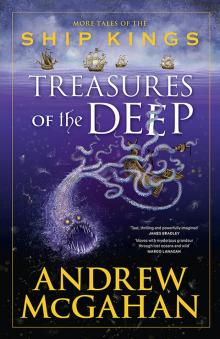 Treasures of the Deep
Treasures of the Deep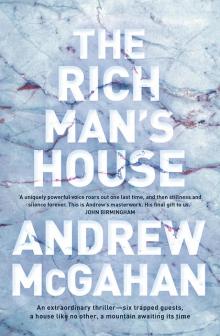 The Rich Man’s House
The Rich Man’s House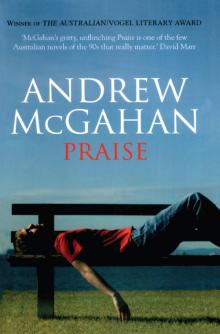 Praise
Praise The White Earth
The White Earth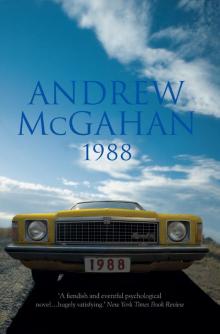 1988
1988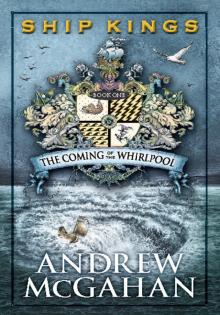 The Coming of the Whirlpool
The Coming of the Whirlpool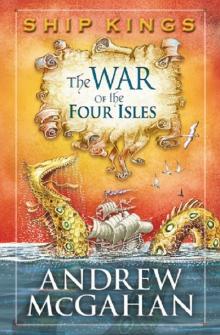 The War of the Four Isles
The War of the Four Isles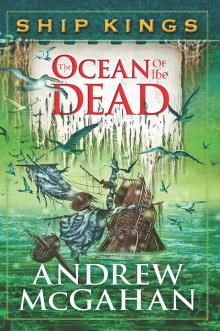 The Ocean of the Dead: Ship Kings 4
The Ocean of the Dead: Ship Kings 4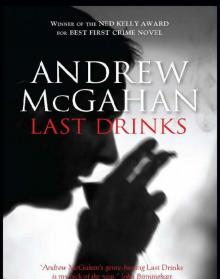 Last Drinks
Last Drinks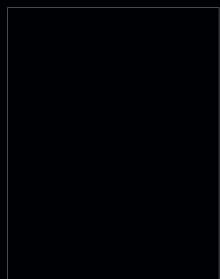 Wonders of a Godless World
Wonders of a Godless World Underground
Underground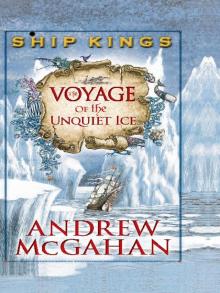 The Voyage of the Unquiet Ice
The Voyage of the Unquiet Ice